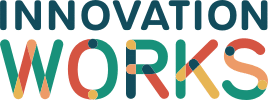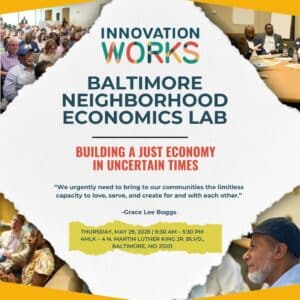
Building a Just Economy in Uncertain Times
Thursday, May 29, 2025
Location: 4MLK 4 N. Martin Luther King Jr. Blvd., Baltimore, MD 21201
Date: Thursday, May 29, 2025
Time: 9:30 AM – 4:00 PM
Networking Mixer: 4:00 – 5:30 PM
The 2025 Baltimore Neighborhood Economics Lab (BNEL) is more than a day-long event—it’s a community-powered space to reimagine how we grow local economies that work for everyone. As economic and political shifts continue to impact our neighborhoods, BNEL brings together social entrepreneurs, grassroots organizers, funders, youth leaders, and policymakers to explore what’s possible when equity, care, and collaboration take the lead.
Fireside Chats
The State of Economic Justice in 2025
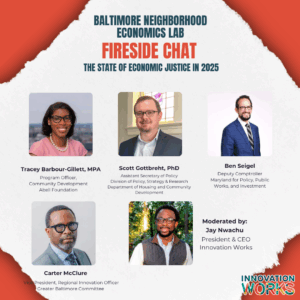
10:00 AM – 10:45 AM
Local leaders will discuss the current realities shaping economic justice, from widening racial wealth gaps to reduced support for social enterprises.
Legacy & Lessons: The Power of Multigenerational Black-Owned Businesses
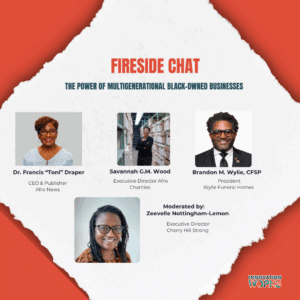
1:30 PM – 2:00 PM
This dialogue brings together representatives from prominent families to share lessons on building and sustaining multigenerational Black-owned businesses amid economic uncertainty.
This year’s sessions will dive into the real-world tensions—and possibilities—facing Baltimore’s communities, including:
Capital in Crisis: Creative Strategies to Sustain Neighborhood Economies
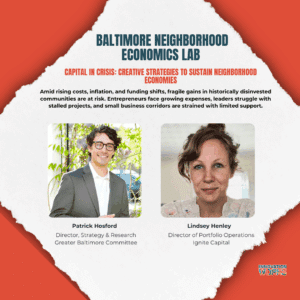
As economic uncertainty continues to mount—through inflation, rising costs of goods and labor, supply chain instability, and shifts in public funding—the fragile gains made in historically disinvested communities are increasingly at risk. Entrepreneurs are facing heightened operational costs, neighborhood leaders are navigating stalled or undercapitalized infrastructure projects, and small business corridors are under pressure to remain vibrant with limited support.
This session will ground participants in the anticipated challenges ahead for local economies and surface the systemic barriers that limit the flow of responsive capital to those on the front lines. More importantly, it will ask: What can we do differently now to protect and advance our progress?
Using a design challenge format, participants will engage in creative, solutions-oriented thinking from three critical perspectives:
- Entrepreneurs sustaining and growing enterprises in the face of economic headwinds
- Neighborhood leaders working to restore and activate commercial assets for long-term community wealth
- Capital allocators—philanthropic, public, and private—who shape how money moves and who benefits
Together, we’ll explore bold, practical ideas that reshape how capital is deployed to ease burdens, fuel resilience, and ensure our local economies don’t just survive—but emerge stronger, more just, and more imaginative than before.
The Invisible Load: Centering Mental and Emotional Wellbeing in Neighborhood Economic Work
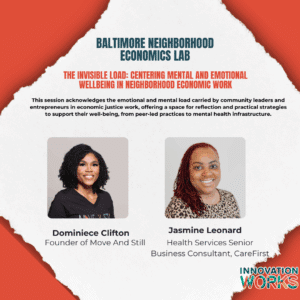
Behind every thriving neighborhood economy are entrepreneurs, organizers, and community leaders who carry an often invisible but heavy emotional and mental load. Whether navigating the constant uncertainty of running a mission-driven business, advocating for long-overdue investment in disinvested communities, or responding to daily crises, these individuals are on the frontlines—and too often, their well-being is overlooked.
This session creates space to bring this unspoken reality to light. Through guided conversation and collective reflection, we will normalize the emotional labor involved in economic justice work and begin to develop practical, creative strategies to support those who shoulder it. From small-scale, peer-led practices to more robust infrastructure, such as mental health supports, sabbatical models, and integrated wellbeing funds, this session will invite participants to dream boldly and act intentionally to ensure care is not a luxury, but a shared responsibility.
The session is designed to be grounding, restorative, and generative—offering both connection and inspiration for building more humane systems around those who carry the weight of change.
The Next Economy: Youth Leadership and the Future of Economic Justice
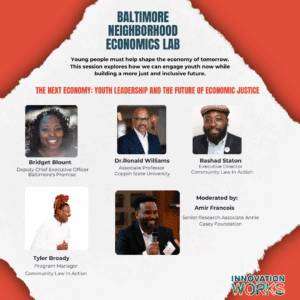
The future economy is being shaped today—and the voices, needs, and leadership of young people must be at the heart of that vision. This interactive session will explore our dual responsibility: to actively engage youth in shaping the present while also building systems that ensure a more just, inclusive, and opportunity-rich future for future generations.
This session will dive into the systemic barriers—such as underinvestment in education, limited access to safe and supportive environments, and economic policies that overlook young people—constraining the future we claim to be building. At the same time, we’ll examine young people’s day-to-day realities and their impact on their ability to imagine and participate in thriving futures.
Facilitated by a mix of systems leaders, educators, and social entrepreneurs working directly with youth, this session will combine education, storytelling, and participatory activities to challenge assumptions, spark dialogue, and generate actionable ideas for how we can better align today’s decisions with the future our youth deserve.
Shared Ownership, Shared Prosperity: Exploring Cooperative and Creative Enterprise Models
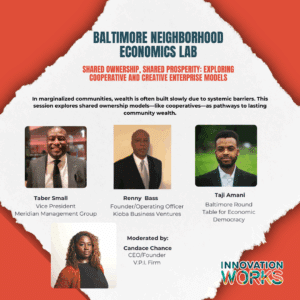
For historically marginalized communities, wealth-building often happens in smaller, hard-won increments—limited by systemic barriers to capital, ownership, and asset-building opportunities. This dialogue session will explore the promise and complexity of shared ownership models, including owner cooperatives, as pathways to long-term prosperity and community wealth.
Through real-life examples and open conversation, we’ll examine how these models—when designed with equity at the center—can offer meaningful opportunities for collective ownership, democratic governance, and economic resilience. We’ll also explore the challenges: from the difficulty of accessing startup capital and technical assistance to the legal and policy hurdles that can slow or stall cooperative development. This session invites a creative and honest dialogue on what it will take to make these models viable and sustainable—from cultural shifts to system-level interventions—and how we can build the infrastructure needed to scale shared ownership as a tool for economic justice.
Schedule at a Glance
9:30 AM – 10:00 AM
Morning Mixer | Light refreshments & networking
10:00 AM – 10:45 AM
Fireside Chat | The State of Economic Justice in 2025
11:00 AM – 12:30 PM
Morning Breakout Sessions
- Capital in Crisis: Creative Strategies to Sustain Neighborhood Economies
- The Invisible Load: Centering Mental and Emotional Wellbeing in Neighborhood Economic Work
12:30 PM – 1:30 PM (Lobby)
Lunch | Buffet & Networking
1:30 PM – 2:00 PM
Fireside Chat | The Power of Multigenerational Black-Owned Businesses
2:00 PM – 3:30 PM
Afternoon Breakout Sessions
- Building the Future Now – Centering Youth in Tomorrow’s Economy
- Shared Ownership, Shared Prosperity – Exploring Cooperative and Creative Enterprise Models
3:30 PM – 4:00 PM
Wrap-Up & Call to Action | Takeaways, next steps, and community commitments
4:00 PM – 5:30 PM
Social Hour | Networking mixer with food, beverages, and music
